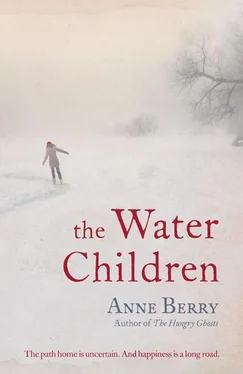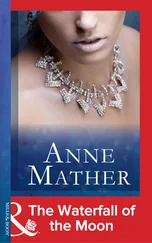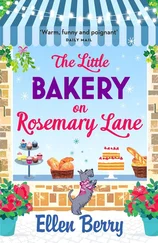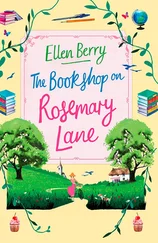The contents of the wardrobe he knows by heart. He is confident that he can faithfully reproduce every dress and skirt, every cardigan and jumper and coat, every blouse and vest and pair of pants, her dressing gown and folded pyjamas. The socks have a drawer all to themselves. They nestle there like rows of white mice, some with lacy cuffs, or bows, or motifs of lambs and baby chicks. The shoes are polished. That is something his father deals with under the heading of ‘Caring for Sarah’s Kit’. Everything must be ordered for a surprise inspection one morning, one fine morning when they will chance to open her door a crack and see the spill of Sarah’s light-golden curls on the pillow. You can smell the polish when you fling wide the cupboard doors, and see the shoes standing to attention like soldiers on parade. They shine as his father’s did that day on the beach, the day she died. And there are tiny wool slippers, and a small pair of wellington boots, bottle green. Sarah’s smell is still here too, though like the curtains and the rag rug, its hallmark lemony heat grows fainter by the week.
His mother comes in every day, religiously, as if attending a daily service. Owen has seen her coiled like a rope on the bed, her knees drawn up, her face pressed to the pillow, to the toys, sobbing dryly. She would prefer Owen not to enter Sarah’s bedroom. She has not expressly banished him, but he has grasped this from the cross engraved on her brow, the downward pull of her mouth, the jump of the nervous tick in her cheek when he approaches the door. So he tries to resist the urge to spend time with Sarah, or at least to put it off until the need has become so strong that he cannot help but succumb to it – as he does now.
Sarah’s last words to him are caged in his head. ‘Don’t leave me, Owen.’ They clang like a heavy chain. ‘Don’t leave me, Owen.’ They make his scalp feel tight and his brain throb. Sometimes it is only the prick of a needle trying to winkle out a splinter, a nagging pain that, although it makes him irritable, is just about tolerable. But sometimes it is an ice pick hacking away in his skull, over and over and over, until the agony of it is unendurable. ‘Don’t leave me, Owen! Don’t leave me, Owen! Don’t leave me, Owen!’ When it is like this he is prepared to do anything to make it stop. He visualizes the ice pick driving into the sentence and cleaving the words apart. Owen. Don’t. Me. Leave. Don’t. Leave. Owen. Me. Leave. Owen. Don’t. Me.
He drives the heels of his hands into his eye-sockets. But it is no good because after a second they begin to reassemble. The word worm wiggles and wiggles the shape of the sentence back again, and then Sarah calls out even more loudly, enunciates ever more clearly, ‘Don’t leave me, Owen! Don’t leave me, Owen! Don’t leave me, Owen!’ And it sounds as if Sarah is right here next to him. There is the stranglehold of her arms belting his waist, and the fairy-dust hair brushing his chest, and the feathery lashes tickling his flesh.
His attention is distracted by the apple-green candlewick bedspread. It is looking threadbare now, as if the moths have gorged themselves on it. Actually it is not the moths but his mother who is responsible for the damage. Her busy fingers have pulled the cotton cords from it so many times that it has de veloped chronic mange. He shuts his eyes again and this time he is besieged by an image of himself. A gangly limbed boy, his mussed sandy hair like a tangle of gold wires in the candle flames. He is swaying slightly on the balls of his feet, feeling suddenly dizzy, the burnt smell in his throat. He draws in his breath with wonder, hypnotized by the glistening crimson arms of the rhubarb stalks, the ruched crowns of buttery yellow and natal green, edging towards the light. The flames flicker as if stirred by his exhaled breath. Their grey felt shadows graze the rough shed walls, tall then short, short then tall again. He can see them etched on his eyelids, jostling one another in their struggle to escape the suffocating wooden womb. He inhales and takes the musty smoke-laced odour deep down into his lungs. He looks automatically to his left, a twin looking for his other half. But Sarah is not there. Wire-wool tears scour his eyes. He blinks them away, and then he sees the Water Child blazing in her place.
Owen is visited by another memory that he omitted from his essay, the memory of a man who gave a brandy glow to his mother’s brown eyes. His name was Ken Bascombe. He was their next-door neighbour’s brother. He came to stay with his sister, Eileen Pope, one summer. He had sold his house in Surbiton and was emigrating to America.
‘Just a few things to do, one or two bits and pieces to sew up and then I’m off,’ he tells Bill, his deep, well-modulated voice bouncing over the garden fence.
Bill has been digging. He always seems to be digging, as if one day he thinks he might unearth something precious. He has soil particles clogging his scant hair, and brown flecks on the lenses of his National Health glasses. And he has a smear of mud on one cheek and a patch on the other, like tribal war paint. He is a primitive native emerging from the jungle, ill-equipped with his garden weaponry for this meeting with tall, suave, sophisticated, civilized man. Owen is wearing a secondary school uniform, grey flannel trousers, a white shirt. He is sitting on the kitchen doorstep in the sunshine pretending to read, but really he is observing, he is observing his father and Ken Bascombe.
‘Oh yes,’ says Ken, adjusting his tie and smoothing back his own abundant, crisp, blond hair. ‘So many more opportunities to make money over there, set up new businesses, get things moving. No limits to what you can achieve in that brave new world.’ Bill leans on his spade and nods. He rubs the inside of a wrist over one cheek, another brushstroke of earth paint.
‘Sounds . . . sounds, well . . . super,’ he manages eventually. He is stripped to the waist. His skin looks as unhealthy as the raw chicken’s spread-eagled inelegantly on the chopping board in the kitchen, waiting patiently to be drawn and quartered. In contrast his nipples seem very pink. They look out of place, as if someone has stuck them on him, as if you could just pinch them off like milk bottle tops. He rolls his shoulders, uncomfortable in his plucked-poultry skin.
‘I tell you, Bill, all those things you dreamt of having, over there in the Big Apple, you can really attain them. They encourage you. Not like here, eh? Slap you down just for trying over here.’ As he talks he describes a big circle with his arms. Owen notices that his hands are shapely, graceful, long fingered, expressive as a musician’s, with very clean, neatly filed nails. He has never scratched about in the dirt, you can tell. He appears to prod the ceiling of the sky, as if he can dip into heaven whenever it pleases him. He gives a chuckle and his magnetic eyes sparkle. Bill’s answering chuckle is a mirthless, agitated cough that is gobbled back hurriedly.
Owen’s eyes flick over the page of the book he is reading, Gone with the Wind , then back to the man. Ken Bascombe is wearing a suit. The fence cuts him in half but the portion he can see is very smart. A cream linen suit, a pressed, laundered shirt, a shiny, blue tie that matches the striking, frosty blue of his eyes. He is tall and handsome, and in his jacket he looks cooler than his father does with nothing on. Now he slides a hand in an inside pocket, produces a packet of cigarettes, and a gold lighter that catches the sun with a scintillating flash. He offers one to Bill who shakes his head. When he starts smoking, Owen squints at him and conjures Rhett Butler.
His mother comes out into the garden to take the washing down from the line. She crosses to the fence holding her empty basket in her arms, and chats easily to Ken Bascombe for a while. Her tone is such a low lisp that he cannot hear what she is saying. His father hangs back, looking oafish. After a few minutes his mother puts down the basket and rests her weight on one leg, the other leg bent back at the knee. She leans over the fence and smiles archly. She accepts the offer of a cigarette, although she knows her husband does not like her smoking. And Ken Bascombe, who will soon be travelling on a ship across the Atlantic Ocean to America, places her cigarette between his lips, holds his own to its tip, inhales deeply, and when it is lit hands it to her. Owen, thinking about how high the price of freedom was for the plantation slaves, notes that unusually his mother’s hair is brushed and loose. She has abandoned her apron too, something unheard of when performing her household tasks, until today, that is. Her cotton-print dress flutters in the gentle breeze, so that her son becomes aware for the first time that his mother has a body, a slender waist, shapely hips, full round breasts. For the rest of the day his mother sings.
Читать дальше











